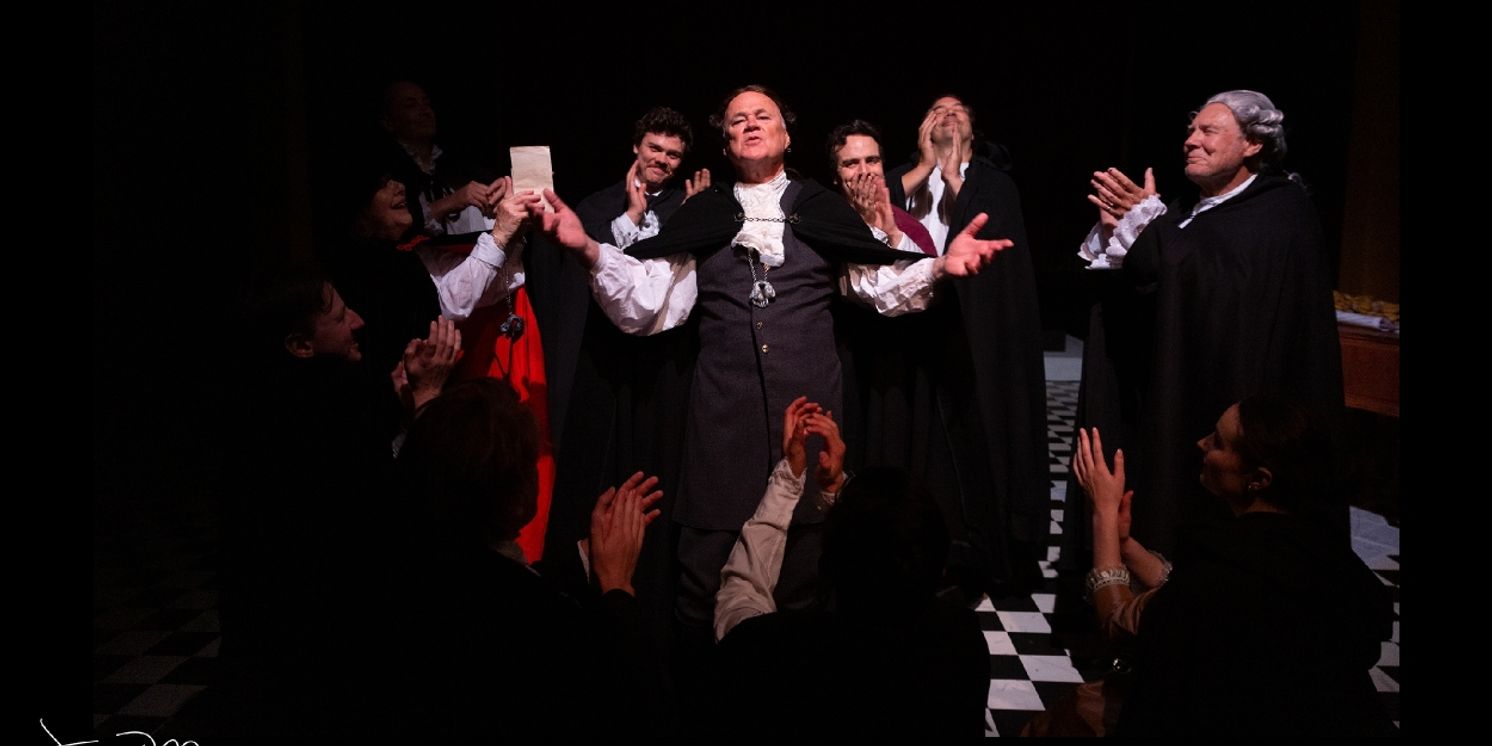
Reviewed by Barry Lenny, Friday 25th November 2022.
Peter Shaffer's 1979 play, Amadeus, opens in 1823 in Vienna, with 73-year-old former court-composer, Antonio Salieri, on his deathbed. In his ramblings, he claims that he was responsible for the death of Wolfgang Amadeus Mozart. He says that he poisoned him, but will explain his actions, and takes us back to his first meeting with the young Mozart, through to the composer's death. As he tells the story, he explains his involvement with Mozart's life and career, and tells how he interfered with the younger musician's chances of success by pretending to be his friend and advisor. Shaffer drew on concepts in the 1830 play, Mozart and Salieri, by Alexander Pushkin. Although the role of Salieri is usually played by a somewhat older actor, he was, in fact, only six years older than Mozart.
Salieri is a devoted Catholic and believes that his God has given him his talent. He had made a pact with God that he would live a pure life if God made him a great and famous composer. He thought that this agreement had been honoured. Before meeting Mozart he is impressed by his music, and looks forward to their meeting. When they do meet, though, he finds a disgusting, boorish, giggling, immature boy/man. Salieri is incensed that God has granted Mozart the genius that he himself lacks, and rails against God whom he feels is mocking him. His powerful speech beginning "Capisco1 I know my fate", declaring to God that, "From now on we are enemies, You and I...", is a popular audition piece for actors, and one that I have used myself. It marks the major turning point in the play.
The production is directed with great understanding and insight by the company's Artistic Director, Rob Croser, drawing on his love and knowledge of the music of Mozart. He also put together the many excerpts of the music of Mozart, Salieri, and a few others that run throughout the performance, adding another level.
The central characters of Mozart and Salieri are played, respectively, by Ben Francis and David Roach. In spite of the title, the main character is Salieri, who never leaves the stage, and so the play is a daunting series of narrative monologues, broken only briefly by a handful of other characters. It is one of the biggest of all roles for an actor. Roach is marvellous as Salieri, giving us a thoroughly believable and infinitely complex characterisation. A couple of momentary pauses were easily forgivable, taking into account the size of the role, and did nothing to distract from his excellent performance.
Salieri, although seemingly trying to destroy Mozart, is, in fact, attacking his god through the younger composer whom he sees as God's instrument on earth, sent to mock him and show him his own mediocrity. Francis is superb as the immature, womanising, repulsive Mozart, with no redeeming social attributes, a giggling fool, yet capable, with no apparent effort, of producing the most sublime music. He presents all of this, then progressively develops the character as he comes face to face with life's realities: poverty, hunger, his wife leaving him, and the eventual descent into madness.
Roach and Francis spark off each other in their scenes together, as Salieri pretends to be Mozart's best friend and supporter and the naïve and gullible Mozart falls for his deception, through to their final, powerful scene where Salieri reveals to the dying Mozart all that he has done.
In all of the subsidiary roles there is equally good work, giving great support to the two main protagonists. This is one of the regular traits of an Independent Theatre production, the attention to every detail, from the principals right through to minor and non-speaking roles, and every technical aspect of a production.
Matt Hein, as Count Orsini-Rosenberg, Julie Quick, as Chamberlain Strack, and David Rapkin, as Baron van Swieten contribute more strong performances as the conservative supporters of Salieri, and opponents to the modernism and innovation of Mozart's music.
Kate Owen, as Mozart's wife, Constanze, plays the role with skill, initially, presenting as silly as he is, but becoming more sensible as the production continues, ending as the responsible wife and mother. Emperor Joseph II is played by Chris Bleby, creating a rather vacuous and musically illiterate character and gaining a few good laughs. Lachlan Williams and Andre Vafiadis are the Venticellos, adding a little more humour as they bring news and gossip to Salieri. Gabe Mangelsdorf and Ryan Kennealy add a little more colour as Salieri's servants, the valet, and the cook.
As always, the set, designed by Roach and Croser, fits the bill perfectly, with the fortepiano, built by Roach and Chris Gilbert, an impressive feature, Sandra Davis and Angela Doherty have provided a great set of costumes, and Simone Roach has been busy looking after the wigs. Luke Bartholomew's lighting design is elaborate, adding varied atmosphere to the performance.
Be sure to book tickets for this rarely performed play, while you have the opportunity.
Photography, Jacqui Munn.
Reader Reviews

Videos

